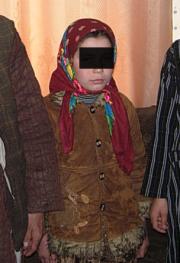Rape is an endemic problem in Afghanistan. Whether women are forced into arranged marriages as child brides, or attacked by family members or local warlords, they are often held responsible for their own victimization. Afghan culture views a woman's virginity as sacrosanct, but Afghan law rarely gives her the chance to defend herself. Many women are thrown out of their families following, or even jailed.
And yet, things are changing. Earlier this summer, Afghan president Hamid Karzai pardoned three men convicted of gang-raping a woman in the northern province of Samangan. The rape took place in 2005 in front of the woman's village, after she had harangued the local warlord's men for forcing her son to become a soldier. At the time the case attracted little attention, and Mr. Karzai probably thought his pardons of three men, who had been sentenced to 11 years in prison, would also slip by unnoticed. The men all come from an influential tribe in the region.
Instead the case has been widely reported throughout the local and national media. Women's rights groups, activists and politicians are up in arms at the injustice. Some might argue that with an election approaching, Mr. Karzai's many enemies are simply using the subject to undermine him - but that does not change the fact that a rape case, and the issues of women's abuse, has taken center stage.
Our next guest voice author, Zarghuna Kargar, notes that an increasing number of rape victims and their families are going public with their cases. Zarghuna, who ran the BBC's Afghan Women's Hour for three years, has spoken to dozens of abused women and is currently writing a book about women in Afghanistan. Here, she tells the story of the family of one rape victim and their search for justice.
By Zarghuna Kargar

"The three men in the car grabbed her and drove to an army barracks where the commander raped her in his office. She [Sweeta] was threatened that if she told anyone about the incident they would kill her parents." (Photo: AHRO)
The girl is thirteen years old and she has been raped, and yet by Afghan standards she is one of the luckier ones. Her family has recognized her trauma and is trying to get her some sort of justice; in many families, she might be viewed as an object of shame and thrown out. The fact that her family members have chosen to stand by her, and that they even spoke out on Afghan national television last month, is an important change in how Afghans view the abuse of women. And the furor surrounding President Karzai's pardons of convicted gang-rapists in a separate case, which a few years ago probably wouldn't have raised many eyebrows, is also testament to this change.
That's partly due to the Afghan government and international organizations' work on raising awareness. The Afghan Ministry of Women's Affairs has opened several safe houses for victims of domestic violence, and USAID has funded a number of publicity drives across the country. The initiative has in turn been picked up by TV and radio programs, which have deliberately confronted such taboo subjects as rape and domestic violence with the aim of encouraging people to recognize their own human rights (not to mention the dual aim of attracting a larger audience).
But I don't want to sound unduly optimistic. Although Afghans may be talking, in limited ways, about rape for the first time, incidents of rape have not decreased. Recent Afghan government sources say that in the last month, twenty five cases of rape in Northern Afghanistan have been registered with the police. The victims were mostly children, and mostly weak and vulnerable. In this girl's case, she was raped by the local warlord, a man with money and guns who expects to get whatever he wants. Those who file complaints are shunned by their communities and in some cases have been raped again by those in power.
All of this makes this case, and the victim's family's advocacy for justice, a remarkable act of courage. Her maternal uncle, Ali Khan, a farmer, notified local media about what had happened but would not name the warlord, when he appeared on television, for fear of retaliation.
"The police chief didn't listen to me - he threatened me of being killed if I spoke about it," Khan said. "I went with my sister and her disabled husband [the girl's father]. He didn't help us because the gangs who raped my niece were powerful and the police chief warned us not to talk to anyone about it." But Khan persisted with his media campaign, contacting local and international journalists. So far no one has been charged.
In another rape case in July, President Karzai dismissed five police officials for failing to act promptly enough in the case. The act by the president sends out the right message, but for every case like this girls, there are a hundred women whose plight is ignored.
Zarghuna Kargar is a broadcast journalist at BBC World Service, and the former anchor of Afghan Women's Hour. The name of the girl in this report has been changed to protect her identity.



